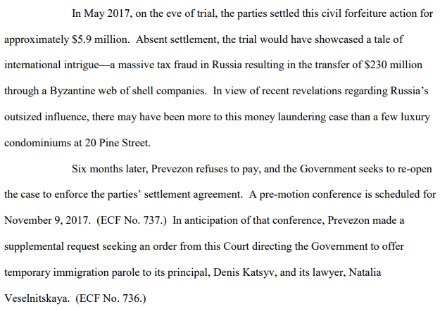An interesting case arose recently involving the denial of immigration parole for a prominent Russian lawyer seeking to represent a client in litigation in the United States.
On November 3, 2017, Judge William H. Pauley III of the United States District Court for the Southern District of New York issued a memorandum and order in United States of America v. Prevezon Holdings, LTD, No. 13-cv-6326 (WHP) (S.D.N.Y. Nov. 3, 2017) [PDF version].1 Before examining the issue involving parole, it is worth providing a brief overview of the litigation. Judge Pauley began by explaining that on May 9, 2017:
[Click image to view full size]
The Department of Justice explained in its news release about the settlement agreement reached in May that it had “settled a money laundering and civil forfeiture action against assets of 11 corporations, including some that own luxury residential and high-end commercial real estate in Manhattan” [PDF version]. The dispute involved a Russian tax evasion and money laundering scheme that had been uncovered by Sergei Magnitsky, who we have discussed in blog posts on site [see blog].
In any event, the U.S. Government sought to reopen the case when Prevezon did not begin making the payments. A pre-motion conference in the case was scheduled for November 9, 2017. The memorandum and order of Judge Pauley concerned Prevezon’s request for him to order the Government to offer immigration parole to its attorney, Natalia Veselnitskaya, to participate in a hearing on November 9, 2017. (note that Prevezon also requested parole for the principal in the case). Veselnitskaya became news in U.S. politics for her role in a 2016 meeting with several officials connected to the campaign of now President Donald Trump, including his son Donald Trump Jr and son-in-law and senior adviser, Jared Kushner. However, in this article, we will focus exclusively on the issue at hand.
The issue in the case was whether Judge Pauley would order the Government to offer Veselnitskaya immigration parole under section 212(d)(5) of the INA for purpose of representing Prevezon. He explained that under statute, the Attorney General may grant parole in his discretion on a case by case basis for (1) urgent humanitarian reasons or (2) significant public benefit. Based on the statutory language, Judge Pauley concluded that the Attorney General enjoyed broad discretion in determining whether to grant temporary parole in the instant case.
In a decision of the United States Court of Appeals for the Second Circuit (the instant case arises in the jurisdiction of the Second Circuit) titled Bertrand v. Sava, 684 F.2d 204, 212 (2d Cir. 1982) [PDF version], the Second Circuit held that section 212(d)(5)(A) gives the Attorney General discretion to deny parole to all or certain groups of aliens if he or she determines that no “emergent public interest reasons” support granting patrol. Judge Pauley noted that Sava, at 213-214, also provided for a limitation in that “[t]he discretion may not be exercised to discriminate invidiously against a particular race or group or to depart without rational explanation from established policies.”
In Sava, the Second Circuit held that the Attorney General’s decision to grant or not grant parole is “presumptively legitimate and bona fide” absent evidence to the contrary. Id. In Sava, the Second Circuit held that, as a result, the burden rest with the alien seeking parole. In the instant case, the burden rest with Prevezon.
Judge Pauley began his analysis of the instant case by stating that “[a]s an initial matter, Prevezon offers very little, if anything, to justify its request.” Prevezon appealed to the “importance of the matter” and the “unusual circumstances of the case.” However, Judge Pauley noted that “[e]very case, however, is consequential in the eyes of a party that has a vested interest in the outcome.” Regarding the “unusual circumstances,” Judge Pauley agreed that the case was unusual, but stated that there was nothing extraordinary about the Government’s anticipated motion that would distinguish it from other cases where a party “seeks to excuse its performance under a settlement agreement.”
Judge Pauley explained that the Government had previously granted temporary parole to Veselnitskaya in 2015 and 2016 to help prepare foreign witnesses, but the government had denied parole connected to the Prevezon case on other occasions. For example, in one instance, the Government denied granting Veselnitskaya parole to attend oral arguments before the Second Circuit. Citing to Sava, at page 218 of the decision, Judge Pauley noted that the Government’s previous exercises of parole only added to the presumptive validity of the Government’s exercising of its parole authority in the instant case.
Regarding the situation concerning the memorandum and order, Judge Pauley noted that the November 9 conference would be “merely an opportunity for each party to summarize its position and for this Court to enter a briefing schedule for the Government’s anticipated motion to enforce the settlement agreement.” Accordingly, he found that the Government’s decision to deny parole for the November 9 hearing was consistent with its previous decision to deny parole for oral arguments before the Second Circuit.
Judge Pauley concluded by applying the rule for reviewing decisions to deny parole: “Absent “strong proof” that the Government’s decision was made “irrationally or in bad faith,” this Court sees no basis to interfere with a decision that sits squarely within the purview of the Executive Branch. Sava, 684 F.2d at 213.”
The case provides an interesting example of how requests for parole for purpose of representing a client in the United States may be considered, in addition to applying the Second Circuit’s general parole review precedent from Sava. The opinion does not foreclose the possibility that Veselnitskaya could be granted parole in connection with her representing Prevezon in subsequent proceedings.






